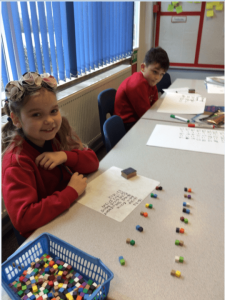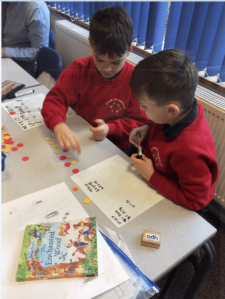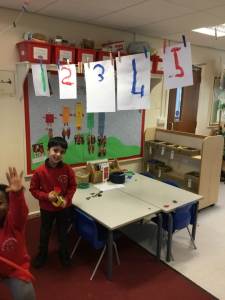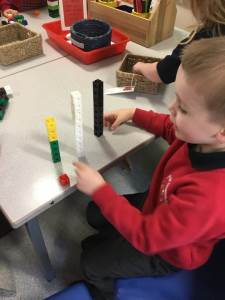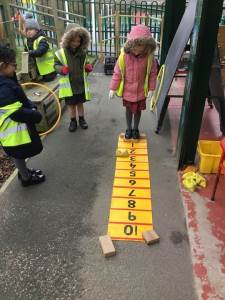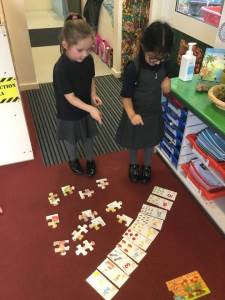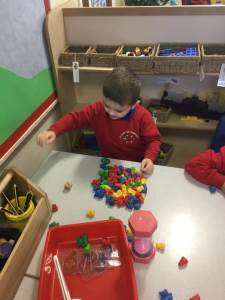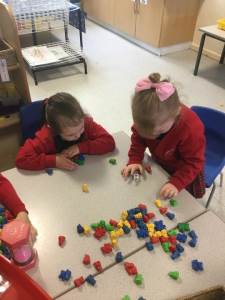Maths
Without mathematics, there’s nothing you can do.
Everything around you is mathematics.
Everything around you is numbers
- Shakuntala Devi (Indian mental calculator and writer, known as the “Human Computer”, 1929-2013)

Intent
The intention at St. John the Evangelist Catholic Primary School is that all children have access to a knowledge-rich curriculum that enhances both knowledge and skills in order to become competent and independent mathematicians. Underpinning all lessons is the mastery approach: teachers will ensure all children build a deep conceptual understanding which enable them to apply their learning in different situations. Through mathematical talk, children will develop the ability to articulate, discuss and explain their thinking. Our curriculum is academically ambitious for all; discipline-led and logically sequenced; designed to support memory and supports our commitment to diversity and inclusion.
Implementation
We recognise that in order for pupils to access and progress to deeper and more complex problems, children need to be confident and fluent across each yearly objective. We follow White Rose Maths' Schemes of Learning alongside the revised ‘Teaching Mathematics in Primary Schools’ document to ensure all objectives are covered for each year group. For each objective, a consistent lesson structure is followed throughout school complementing our ‘teaching for mastery’ approach.
Teachers follow White Rose Maths' Schemes of Learning and guidance. Teachers can draw upon a range of other sources to supplement, support, or stretch our children in Maths, such as: NCETM, I See Reasoning by Gareth Metcalfe or NRich, but these other sources are not used in place of White Rose Maths.
As well as this, children’s fluency skills are enhanced further through daily ‘Fluent in Five’ sessions and reasoning skills are promoted and developed in ‘Rapid Reasoning’ interventions.
To enable all to flourish, teachers will use shared and guided practice along with providing the necessary resources for children to access the curriculum and encourage them to use these where appropriate to independently apply their growing knowledge and skills to explain their logic and reasoning.
In line with the National Curriculum, it is expected that pupils will move through their year group programmes of study at broadly the same pace, ensuring no ceiling is imposed on what learners can achieve. While there is only one curriculum, we recognise that not all learners come to each lesson at the same starting point. For this reason, we provide additional resources, such as Ready to Progress interventions and response signposts (i.e. re-teach concepts and booster units/lessons) for every diagnostic question which are designed to help learners access the main curriculum. Differentiated independent tasks are provided as a starting point for teachers to increase challenge and increase support, which exemplify a range of adapting techniques including scaffolding, constraints and applying learning within an unfamiliar context.
Concrete, Pictorial, Abstract
Objects, pictures, words, numbers and symbols are everywhere. The mastery approach incorporates all of these to help children explore and demonstrate mathematical ideas, enrich their learning experience and deepen understanding. Together, these elements help cement knowledge so pupils truly understand what they’ve learnt.
All pupils, when introduced to a key new concept, should have the opportunity to build competency in this topic by taking this approach. Pupils are encouraged to physically represent mathematical concepts. Objects and pictures are used to demonstrate and visualise abstract ideas, alongside numbers and symbols.
Concrete – Children have the opportunity to use concrete objects and manipulatives to help them understand and explain what they are doing.
Pictorial – Children then build on this concrete approach by using pictorial representations, which can then be used to reason and solve problems.
Abstract – With the foundations firmly laid, children can move to an abstract approach using numbers and key concepts with confidence.
Impact
- Children demonstrate a quick recall of facts and procedures.
- Children are given the opportunity to develop their reasoning skills verbally, pictorially and in written form.
- Children use mathematical language to explain their ideas and can apply the concept to new problems in unfamiliar situations.
- All children are challenged and are encouraged to apply new mathematical concepts in various ways.
- Children show a high level of pride, presentation and understanding of the work.
- Lessons are stimulating and allow children to represent new learning in different ways.
- Lessons are carefully planned and sequenced allowing children to develop and refine their skills.
- Learning is tracked and monitored to ensure children excel and reach their potential.
- Children believe they can achieve and have a 'Can Do' attitude to learning.
National Curriculum Objectives
To find out what your child will be expected to achieve, please click on the relevant year group:
-
year-1-maths-objectives-for-2014
download_for_offline
download_for_offlineyear-1-maths-objectives-for-2014
- year-2-maths-objectives-for-2014 download_for_offline
download_for_offlineyear-2-maths-objectives-for-2014
- year-3-maths-objectives-for-2014 download_for_offline
download_for_offlineyear-3-maths-objectives-for-2014
- year-4-maths-objectives-for-2014 download_for_offline
↑download_for_offlineyear-4-maths-objectives-for-2014
- year-5-maths-objectives-for-2014 download_for_offline
download_for_offlineyear-5-maths-objectives-for-2014
- year-6-maths-objectives-for-2014 download_for_offline
download_for_offlineyear-6-maths-objectives-for-2014
White Rose Maths
We follow White Rose Maths’ recently updated Schemes of Learning. These provide an overview of the maths children will be learning as they progress through school. Each year group is split into three terms (Autumn, Spring, Summer) and each term compromises individual blocks of learning about a particular topic. Each block is broken down into small steps which ensure the children can develop depth and breadth as they work through the curriculum. In addition, teachers compliment this scheme by drawing upon the ‘Ready to Progress’ Document and NCETM materials where appropriate.
new nc ready to progress 2024 white rose.pdf
Calculation Policies
These policies outline models and images, which teachers use to support teaching of different concepts.
At the end of the document, there is a glossary. This outlines key language used when teaching the four operations.
Click on the links to read the policies:
-
addition-and-subtraction-calculation-policy
download_for_offline
download_for_offlineaddition-and-subtraction-calculation-policy
- multiplication-and-division-calculation-policy download_for_offline
download_for_offlinemultiplication-and-division-calculation-policy
Working Walls
Working walls are used to model different representations of key concepts, familiarise children with key vocabulary and provide visual reinforcements for children to reason on a regular basis.

Highlights from some of our Maths Lessons...
Maths in the Early Years
Ways you can support your child at home
Online Learning
There are home learning videos for every small step your child needs to know
by the end of the year, from Reception to Year 6.
These are fun, effective and easy to use. To access the online videos, click here
Parent Workbooks
To support your child further with maths at home, there are free workbooks available.
To access these workbooks, click here
Illustrated Maths Dictionary
Help your child to learn key vocabulary by clicking here
Numbots and Times Tables Rockstars
Numbots helps children develop their calculation skills. In Story Mode, the emphasis is on mathematical concepts and is underpinned by a mastery
approach to teaching. Story Mode features visual representations, procedural variation, exposure
to different calculation strategies and interleaved material all in very carefully sequenced order.Visit the Numbots site by clicking here
TTRS supports your child in developing their fluency skills with their times tables.
Look out for our termly 'Battle of the Bands' tournaments!
Visit the TTRS site by clicking here
Parent Guides

Click below the images below to read through the parent guides...
- multiplication-and-division-calculation-policy download_for_offline
- year-2-maths-objectives-for-2014 download_for_offline






